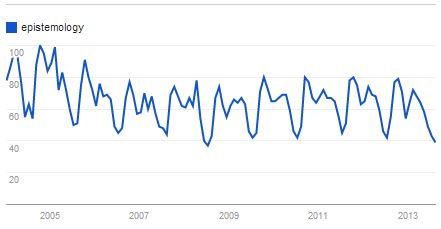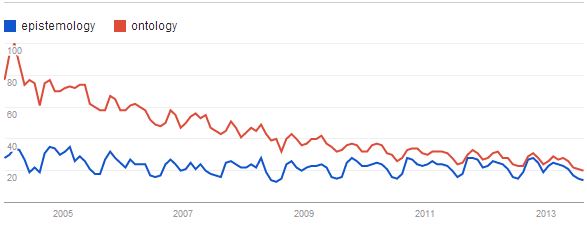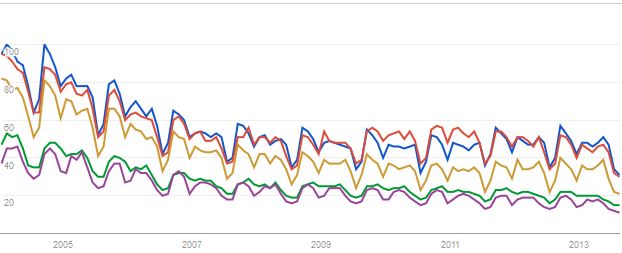The annual heartbeat of epistemology
Okay, I had to post this, as I found it to be … weirdly fascinating. Google has a tool that allows you to search for terms and see how they have trended over time based on global search volume. The service is called Google Trends, check it out.
Here is the result for the term “epistemology”:
Apparently interest for the term “epistemology” follows a strong yearly cycle, with two maximum values in October and Feb/March and one strong minimum in July. Interestingly, the same basic pattern applies to the closely related term “ontology” (“close” if you are in philosophy, that is):
This of course prompts further research, for example, comparing searches for “chemistry”, “physics”, “biology”, “philosophy” and “ethics”:
This suggests that all of these terms, which are largely academic in nature, may follow the yearly pattern of research in academic institutions.
The same basic pattern of double peaks in October-ish and February-ish, with strong minima in July (summer break!), repeats for many “academic” words.
What is troubling/interesting is the clear decline from 2004 (the first year data is available) through the late 2000’s of ALL of these searches… except for “epistemology”, which seems pretty steady.
Questions:
- Why two distinct peaks at these times? Is this when all the papers are due?
- How do these results square with the fact that the data here is global? Are the academic calendars worldwide similar?
- Looking at the countries with the highest number of results for these terms shows that it is largely driven by searches in the US, India, Australia, east African countries and specifically Nigeria. Europe is prominently not prominent. What to make of this interesting spread?
- The downward trend in all the search terms has leveled off around 2008; but why did it decline in the first place and why has it been steady for the past 4 years?
Your thoughts on these mysteries are welcome!







I don’t think this follows the pattern of research, but the pattern of courses. After all, the most correlated research is “definition epistemology”.
As for europe, most people are probably searching in their own tongue.
Yeah, I actually meant by “research” the research done by students who had to write papers. It makes sense that most of the research would be student-based (correlation w/ searches for “definition XX”). I would expect most of that to be high school or undergrad, as anyone further than that would be less likely to search for basic definitions (or so I suspect… although I often read over wikipedia pages for basic definitions for terms I am already intimately familiar with to get a different perspective and to see what “normal” usage tends towards).
And I think you are probably right about Europe. Do you know if higher education in Nigeria is primarily in English?
I would expect so:
http://en.wikipedia.org/wiki/Nigeria
Official languages English